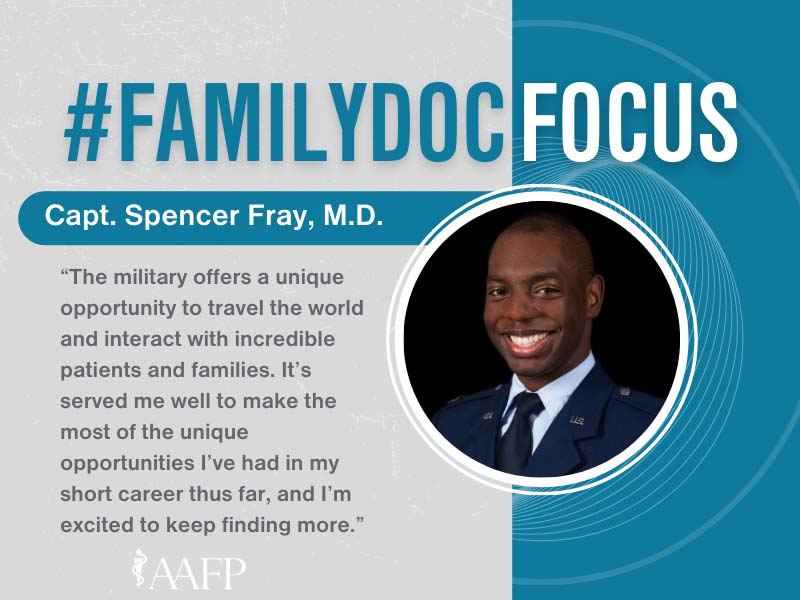Air Force Doc Continuing Legacy of Leadership
February 1, 2022, 1:52 p.m. David Mitchell — When U.S. Air Force Capt. Spencer Fray, M.D., was a high school student pondering a career that combined medicine and the military, he didn’t have to look far for guidance and support.

“The first thing my mom recommended was, ‘You need to go talk to your aunt,’” Fray said. “It was really good advice.”
Fray’s aunt is Jeannette South-Paul, M.D., who retired in 2020 after nearly 20 years as the family medicine chair at the University of Pittsburgh School of Medicine. South-Paul promptly offered her nephew a list of undergraduate institutions with good reputations for counseling premed minority students and helping them get into medical schools.
One of the schools on that list was Pitt, where Fray matriculated and completed his undergraduate degree.
“Being in such close proximity to my aunt throughout my premed training allowed me the opportunity to see firsthand how broad a career in family medicine could be,” he said. “I already knew I wanted to be a family physician, and she was consistently there to give me advice and direction.”
South-Paul served as president of the Uniformed Services AFP and the Society of Teachers of Family Medicine; served two terms as a member of the Association of Departments of Family Medicine’s Board of Directors; and chaired task forces, commissions and committees for the AAFP, the Association of American Medical Colleges and the Council of Academic Family Medicine in addition to numerous other local, state and regional leadership roles.
“I look back on my experiences at Pitt with my aunt and her involvement in the different organizations that she was a part of,” Fray said. “She often invited me to participate in meetings or dinners that she would have with colleagues and medical students. Those were invaluable and defining experiences early in my training, which expanded my view of what family doctors can accomplish. I quickly appreciated that becoming involved in the overall field of family medicine, in tandem with the clinical practice of it, was a way to accomplish more than what we do for our patients within a 20-minute visit. I’ve been seeking out those types of opportunities ever since, which is what prompted me to get involved with USAFP in the first place.”
Despite her position at Pitt, South-Paul — who retired from the U.S. Army as a colonel in 2001 — encouraged Fray to consider the F. Edward Hébert School of Medicine at the Uniformed Services University of the Health Sciences in Bethesda, M.D., for the next step in his training. She had served as the family medicine chair and vice president of minority affairs at USUHS from 1995 to 2001.
“I thought about the fact that I envisioned myself in a military career like many of my family members, and I ultimately wanted to go to the school that would give me the best training,” said Fray, who was able to complete his flight medicine certification while at USUHS — an opportunity unique to the military’s medical school. Fray completed his residency training in family medicine last summer at Nellis Air Force Base in Nevada.
Fray served on a Diversity and Inclusion Committee at USUHS in 2016-18 and was a Uniformed Services AFP representative last year at the National Conference of Constituency Leaders. At that leadership development event, he was elected as a minority member constituency co-convener and also will serve as a member constituency alternate delegate to the AAFP's Congress of Delegates.
His aunt served as an alternate delegate and delegate to the COD from 1995 to 1998. Fray said he’s proud of that legacy.
“There are undeniably some similarities to our careers so far, but I’ve always felt free to choose my own goals as well as the path that I take to reach them,” said Fray, who followed his father, a retired pilot, into the Air Force. “My goal is to make a positive impact on others throughout my career, and I know I’m better positioned to do so because of the strong legacy of my aunt and others like her.”
Fray currently is stationed with a U-2 reconnaissance unit deployed in Europe. He is responsible for the care of about 200 personnel. In addition to practicing primary care, including minor procedures and acupuncture, he assesses pilots before and after flights for altitude-related issues like decompression sickness. The U-2 operates at more than 70,000 feet, and flights can last more than eight hours.
“Although I’m currently in a flight medicine position, the Air Force specifically wanted a family medicine-trained doctor for the assignment,” he said. “Out here, medical support is a two-person team, the medical technician and the flight doc. As such, the Air Force needed someone who could practice full-scope medicine and take care of the largest number of patients. Our main role is to support the pilots, but we take care of everybody.”
The Uniformed Services medical school offers a tuition-free education with a commitment for military service after graduation. Fray has a seven-year commitment to the Air Force, but he’s planning on serving long-term. He’ll be at his current post until July 2023. Beyond that, he’s not sure where he will be, and he’s OK with that.
“The military offers a unique opportunity to travel the world and interact with incredible patients and families,” he said. “It’s served me well to make the most of the unique opportunities I’ve had in my short career thus far, and I’m excited to keep finding more. I’m confident that along the way, I will help support and guide others just as my aunt did for me. That’s a legacy I’m honored to continue.”